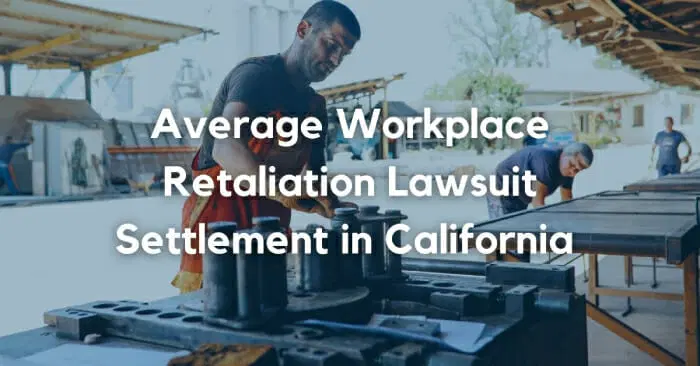
Average Retaliation Lawsuit Settlement in California
Legally reviewed by: Jessica Anvar Stotz, JD, MBA
Short answer: The average retaliation lawsuit settlement in California typically ranges from $20,000 to $40,000. However, it is important to note that retaliation settlement amounts can vary widely depending on the specific circumstances of each case, with some settlements being significantly higher or lower.
Workplace retaliation in California, refers to adverse actions taken by an employer against an employee as a response to the employee’s engagement in legally protected activities, such as filing a complaint about workplace violations or reporting unlawful behavior.
It is crucial to understand that workplace retaliation is unlawful and violates the employee’s rights protected under state and federal laws.
Workplace retaliation settlements and claims have emerged as a prominent issue and are among the most prevalent harassment charges reported to the Equal Employment Opportunity Commission (EEOC) every year.
In fact, an alarming 49% of all EEOC filings pertain to workplace retaliation. Employees who believe they have experienced retaliation have the right to seek legal recourse and pursue fair compensation for the harm they endured.
Possible Retaliation Lawsuit Settlement Amounts in California
| Category | Average Settlement Amount |
| Low | Approximately: $5,000 – $20,000 |
| Moderate | Approximately: $20,000 – $50,000 |
| High | Approximately: $50,000+ |
Example Retaliation Lawsuit Settlements in California
- A $25 million dollar verdict was issued to a 56-year-old medical device sales manager who faced retaliation and termination after reporting possible Anti-Kickback Law, Sunshine Act, FDA, and Sarbanes-Oxley Act violations to the company’s legal counsel. The jury unanimously found liability for Whistleblower Retaliation and Wrongful Termination, awarding $2.7 million in compensatory damages. Additionally, the jury unanimously voted 10-2 on a finding of malice, leading to $22.4 million in punitive damages. This verdict is believed to be one of the largest single-plaintiff Whistleblower Retaliation verdicts in American history.
- $37 million was awarded to 129 former employees of the United States Department of Energy’s Lawrence Livermore National Laboratory who claimed that they lost their jobs due to age discrimination. The workers alleged that a layoff was the Lab’s way of getting rid of older employees and hiring younger people for less wages. The claims were litigated in two separate jury trials, one alleging breach of the employees’ contracts, and one alleging age discrimination. The employees won the breach of contract claims, and the Lab prevailed on the age discrimination claims, but with both jury verdicts on appeal, the Lab opted to settle both.
- An LAPD employee received a $1 million settlement in her discrimination, harassment, and retaliation lawsuit against the City of Los Angeles. The plaintiff faced mistreatment after experiencing medical complications during her pregnancy, with LAPD command staff violating company policy during her maternity leave. Subsequent injuries led to an investigation and restrictions on her return to work, which her supervisors repeatedly violated. The case was based on California Labor Code section 1102.5, commonly known as the “whistleblower law,” protecting workers who report illegal conduct in the workplace. The amendments to Section 1102.5 expanded protections for employees who genuinely believe they are reporting illegal actions, regardless of the final outcome of the complaint.
Workplace Retaliation Evaluator Quiz
Take this short 90 second quiz to see if you might have a valid workplace retaliation quiz.
What is the largest retaliation settlement in California & the U.S.?
Ani Chopourian, a 45-year-old former cardiac surgery physician assistant, won a $168 million judgment in a harassment suit against Mercy General Hospital, a Sacramento hospital. Chopourian alleged that she faced sexually inappropriate conduct, bullying, and retaliation during her two-year employment at the hospital. Surgeons and medical staff subjected her to various forms of harassment, including verbal sexual harassment and derogatory remarks about her heritage. The jury awarded her $125 million in punitive damages, $39 million for mental anguish, and $3.5 million for lost wages and benefits. The verdict is believed to be among the largest retaliation settlements for a single employee in U.S. history, sending a powerful message against workplace harassment and retaliation.
What Makes a Good Retaliation Case?
A compelling retaliation case relies on strong and concrete evidence that establishes a clear link between the adverse employment action and the protected activity. This evidence can take various forms, such as emails, memos, witness statements, or performance evaluations, which demonstrate a discernible negative shift in the plaintiff’s treatment after engaging in the protected activity. Crucially, a well-documented timeline plays a vital role in establishing the causation between the adverse action and the protected activity. The closer in time the adverse action occurs to the protected activity, the stronger the case for retaliation becomes.
A successful retaliation case requires the support of a skilled attorney experienced in employment law. A skilled attorney proficient in labor laws can construct a compelling argument based on the presented evidence. They know how to navigate potential legal obstacles, conduct thorough investigations, and effectively advocate for the plaintiff’s rights.
What Does a Settlement Check Cover?
Retaliation lawsuit payouts typically cover the agreed-upon amount that resolves a legal dispute or claim between two parties. When the parties reach a settlement, they agree to forego further legal action in exchange for a specific sum of money. The settlement check is issued by the party responsible for payment and is generally intended to compensate the recipient for damages, losses, or injuries mentioned in the settlement agreement.
The scope of a settlement check can vary widely depending on the nature of the case. For personal injury case settlements, the check may cover medical expenses, lost wages, pain and suffering, and other related costs. For retaliation case settlements, the check may include back pay, future wages, compensation for emotional distress, and attorney fees. For contractual disputes, the settlement check might cover financial damages resulting from the breach of contract.
The settlement check represents the final resolution of the dispute, and upon receipt and clearance, the recipient generally agrees not to pursue any further legal action related to the specific matter covered by the settlement.
What Are the Three Elements of a Retaliation Claim?
The three elements of a retaliation claim are:
- Protected Activity: The first element requires the plaintiff to demonstrate that they engaged in a protected activity, such as reporting discrimination, harassment, or other unlawful conduct in the workplace. This activity is safeguarded by various employment laws
- Adverse Employment Action: The second element entails showing that the employer took adverse action against the plaintiff in response to their protected activity. Adverse actions can include termination, demotion, pay reduction, harassment, or any action that negatively affects the terms and conditions of employment.
- Causal Connection: The final element necessitates establishing a causal connection between the protected activity and the adverse employment action, indicating that the retaliation was a direct result of the plaintiff’s engagement in the protected activity.
What Else is Needed to Prove a Retaliation Claim in California?
In addition to the three elements required to prove a retaliation claim, plaintiffs in California must also present:
- Knowledge of Protected Activity: It must be demonstrated that the employer was aware of the plaintiff’s engagement in the protected activity before taking the adverse employment action.
- Lack of Legitimate Non-Retaliatory Reason: Plaintiffs must establish that the adverse action was solely in response to their protected activity and not based on any legitimate, non-retaliatory reason.
- Timing: Proximity in time between the protected activity and the adverse action is crucial to strengthen the retaliation claim and show a causal connection.
- Evidence: Plaintiffs need sufficient evidence, such as documentation, witnesses, or corroborative statements, to support their claim of retaliation.
Is it Easy to File a Claim?
Filing a claim for retaliation in California can be relatively straightforward in terms of the initial steps. Employees who believe they have experienced retaliation can file a complaint with the EEOC or the California Department of Fair Employment and Housing (DFEH). These agencies handle discrimination and retaliation claims in California.
The process generally involves filling out a complaint form, providing relevant details about the retaliation incident, and submitting it to the appropriate agency. Additionally, some employees may choose to consult with an employment attorney to ensure they understand their rights and have all the necessary documentation.
While the initial filing may be simple, proving a retaliation claim and navigating the legal process can be more challenging. To build a strong case, employees need to provide evidence linking the adverse action to the protected activity and demonstrate that retaliation occurred. This may involve gathering witnesses, documents, and other evidence to support the claim.

How do you do it?
To file a workplace retaliation claim in California, follow these steps:
- Document incidents: Keep detailed records of any incidents related to the alleged retaliation. Include dates, times, locations, people involved, and a description of what occurred.
- Know your rights: Familiarize yourself with California labor laws and federal laws, such as Title VII of the Civil Rights Act and the California Fair Employment and Housing Act (FEHA), which protect employees from retaliation.
- Internal complaint: If your employer has a formal complaint process, file an internal complaint about the retaliation with the human resources department or the appropriate authority within your organization.
- Contact the DFEH or EEOC: If your employer does not address the issue or you believe the internal process is inadequate, you can file a retaliation complaint with the California Department of Fair Employment and Housing (DFEH) or the federal Equal Employment Opportunity Commission (EEOC). You may need to file with one or both agencies, depending on the specific circumstances.
- Gather evidence: Collect any relevant evidence, such as emails, text messages, witness statements, performance reviews, or other documentation that supports your claim of retaliation.
- Submit the complaint: Fill out the appropriate complaint form for either the DFEH or EEOC and submit it to the respective agency. Be sure to provide all necessary information and documentation to support your claim.
- Cooperate with investigations: After filing the complaint, the agency will conduct an investigation into your claim. Be prepared to cooperate fully during this process, providing additional information if requested.
- Seek legal advice: Consider consulting with an employment attorney experienced in handling retaliation cases. They can provide guidance, review your case, and advocate on your behalf throughout the process.
The process of filing a workplace retaliation claim can be complex and the specific steps may vary depending on your unique situation. Seeking legal advice and assistance can help ensure that your rights are protected and increase your chances of a successful resolution.
Is it Worth Suing?
Yes, it can be worth suing in certain situations when you have a strong case and believe that you have been wronged. Suing may be worth it to seek justice, hold the responsible party accountable, and obtain compensation for damages, lost wages, or emotional distress caused by workplace retaliation. Additionally, a successful lawsuit can help prevent future retaliation against you and others.
Before deciding to file a lawsuit, we highly recommend weighing the potential costs, time, and emotional toll of litigation. Consulting with an experienced employment attorney can help you assess the merits of your case and make an informed decision about pursuing legal action against your employer.
Frequently Asked Questions
Are retaliation claims rare in California?
Retaliation claims are not rare in California. They are relatively common, as employees in California are protected by strong labor laws that prohibit retaliation for engaging in protected activities such as reporting workplace violations, discrimination, harassment, or participating in legal proceedings.
What is the burden of proof for retaliation?
The burden of proof for retaliation in California requires the plaintiff (the employee making the claim) to show by a preponderance of evidence that they engaged in protected activity, experienced adverse employment action, and that there exists a causal link between the protected activity and the adverse action.
Get in Touch with a Lawyer
If you have any questions regarding a workplace retaliation case in California, LawLinq can help. As your trusted lawyer referral service, we connect individuals in California with top-notch attorneys in various fields, including Employment law, at no cost.
Our member attorneys work on a contingency fee basis, meaning you only pay if they win your case or secure compensation. Please note that our services are exclusively available to clients in California. For reliable and exceptional legal support, call us at (855) 997-2558 or visit our site today.
Additional Employment Law Resources
- California Wrongful Termination
- Average Wrongful Termination Settlement in California
- Workplace Harassment California
- Hostile Work Environment California
- Workplace Bullying California
- Gender Discrimination California
- Age Discrimination California


